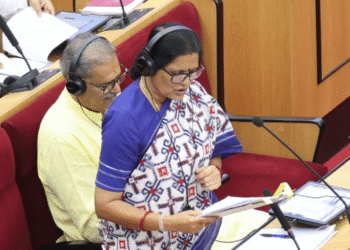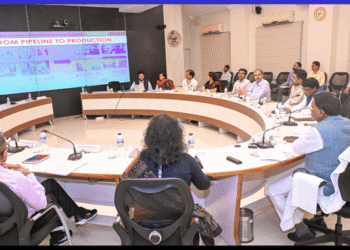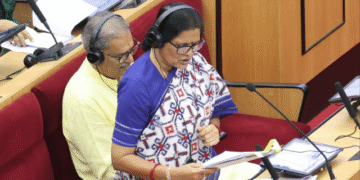The State Level Conference on Rabi Campaign 2025-26 was convened today at the Krushi Bhavan Auditorium, emphasising the promotion of pulses, oilseeds, and horticultural crops alongside the adoption of technology-driven, climate-resilient agricultural practices.
The event, attended by key dignitaries including Deputy Chief Minister and Minister for Agriculture & Farmers’ Empowerment and Energy Kanak Vardhan Singh Deo, DC-cum-ACS Anu Garg, and Principal Secretary of Agriculture Dr Arabinda Kumar Padhee, marked a pivotal step in Odisha’s agricultural strategy.
The Rabi Campaign, approved by the Chief Secretary of Odisha on October 22, 2025, outlines an ambitious plan to cultivate approximately 29.30 lakh hectares across various crops. This includes 15.13 lakh hectares dedicated to pulses, 3.70 lakh hectares to oilseeds, 4.97 lakh hectares to vegetables, 1.15 lakh hectares to condiments, and 0.21 lakh hectares to sugarcane. The initiative sets production targets at 23.26 lakh metric tonnes (MT) for food grains, 8.20 lakh MT for pulses, and 4.21 lakh MT for oilseeds, aiming to boost farmer incomes and food security.

In his keynote address, Deputy Chief Minister Singh Deo underscored the need for proactive government machinery, close coordination, and timely supply of inputs to realise the campaign’s vision. He advocated for effective inter-departmental convergence and continuous field-level monitoring, while suggesting the conversion of unused agricultural farms into storage facilities. “Strong leadership, dedicated supervision, and result-oriented implementation are essential to ensure these benefits reach our farmers, paving the way for a productive, prosperous, and climate-resilient Rabi season,” he stated.
DC-cum-ACS Smt. Anu Garg highlighted the state’s achievement of surplus water levels in reservoirs, setting a goal to provide irrigation facilities to 90% of cultivable areas. She emphasised efficient water usage in agriculture to maximise productivity and sustainability.
Principal Secretary Dr Arabinda Kumar Padhee elaborated on the strategic focus of the Rabi Programme 2025-26, which prioritises enhancing the area and productivity of pulses and oilseeds to achieve self-sufficiency (Atmanirbharata) in these crops. He noted the signing of a Memorandum of Understanding (MoU) between the Department of Agriculture and Farmers’ Empowerment (DAFP) and the International Center for Agricultural Research in the Dry Areas (ICARDA) for variety development.

Dr Padhee stressed the importance of coordinated efforts in implementing flagship national programs such as the Prime Minister Dhan Dhanya Krishi Yojana (PMDDKY), National Pulse Mission, NMEO-Oilseed, National Food Security Mission (NFSM), National Horticulture Mission, Jackfruit Mission, National Mission on Sustainable Agriculture (NMSA), Rashtriya Krishi Vikas Yojana (RKVY), Pradhan Mantri Krishi Sinchayee Yojana (PMKSY), and Pradhan Mantri Fasal Bima Yojana (PMFBY).
He also called for vigorous execution of state-run initiatives, including Shree Anna Abhiyan, Rice Fallow Management, Balabhadra Jaivik Chasa Mission, Farm Mechanisation, and other collaborative programs to accelerate agricultural growth and improve farmers’ livelihoods. In the horticulture sector, Dr. Padhee pointed to steady expansion with farmers adopting modern technologies for high-value crops, urging regular monitoring of schemes like the Mission for Integrated Development of Horticulture (MIDH), PMKSY, NMEO-Oil Palm, and state programs for potato, vegetables, spices, and fruit-specific developments.

Additionally, soil conservation and watershed initiatives such as the Coffee Mission, Mahatma Gandhi National Rural Employment Guarantee Scheme (MGNREGS), Rainfed Area Development, and Odisha Mineral Bearing Areas Development Corporation (OMBADC) were highlighted for their role in promoting sustainable agriculture in rainfed regions.
A Rabi Circular has been issued by the Chief Secretary to all district Collectors, directing them to tailor strategies to their local agro-ecological conditions. The conference also saw participation from Odisha University of Agriculture and Technology (OUAT) Vice-Chancellor Dr. Prabhat Kumar Roul, Director of Agriculture Shri Subham Saxena, Director of Horticulture Shri Kalunge Gorakh Waman, Director of Soil Conservation Shri Subrat Kumar Panda, and other senior officials.
This conference signals Odisha’s commitment to transforming its agricultural landscape through innovation, sustainability, and self-reliance, setting the stage for a bountiful Rabi season.






























